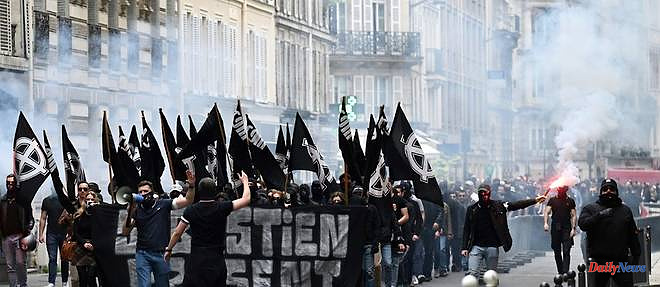The demonstration on Saturday in Paris by several hundred ultra-right activists, which had not been banned, aroused strong criticism on the left on Monday, leading the police headquarters to justify themselves in a press release.
Monday, on Twitter, the socialist senator from Paris David Assouline notably challenged the Minister of the Interior Gérald Darmanin, considering "inadmissible to have let 500 neo-Nazis and fascists parade in the heart of Paris". "Explain yourself!" he tweeted.
Also on Twitter, PCF spokesman Ian Brossat, elected from Paris, for his part was ironic in the middle of the day, writing: "pans are clearly more dangerous than the sound of boots...".
Since the adoption of the controversial pension law, bans on demonstrations have multiplied in France to avoid "casserolades" against President Emmanuel Macron and members of the government.
The Paris police headquarters (PP) justified in a long press release the non-banning of the ultra-right demonstration.
Nearly 600 activists from the May 9 committee, according to the authorities, demonstrated on Saturday in Paris to commemorate the 29th anniversary of the death of far-right activist Sébastien Deyzieu, who died accidentally in 1994. These demonstrators, dressed in black and often masked, exhibited black flags marked with the Celtic cross and chanted, at the end of the rally, "Europe youth revolution", the slogan of the GUD (Defence Union Group), noted AFP.
The PP underlined that "insofar as this demonstration had not caused, in previous years, any overflow or disturbance to public order, the prefect of police was not justified in issuing a prohibition order against it. ".
She argued that last January, the prefect of police's order prohibiting a torchlight march by "Paris Pride" (an association deemed to be on the far right), had "been suspended" by the judge. The administrative court had estimated, noted the PP, that "the alleged history of disturbances on the sidelines of the gatherings organized by this same collective in previous years did not (allow) alone to establish a risk of disturbance to public order sufficient to justify the ban on demonstrations".
"The May 6 demonstration was subject to appropriate supervision by the police, to avoid any risk of excesses or clashes," added the police headquarters, which had issued an order authorizing the demonstration. recording of images by drone. She promised that "any criminal act observed during this demonstration or that the subsequent exploitation of the images would make it possible to identify will (it) be the subject of a report to the judicial authority".
On BFMTV, the prefect of police Laurent Nuñez announced that he had "seized without waiting for the Paris prosecutor" on the fact "that individuals, most of them, showed their faces concealed". What constitutes an offence.
"The legal conditions were not met to ban this demonstration. I fully assume it," he insisted.
The prefect was annoyed that some could accuse him of being "more tolerant with the far right than with the far left". "It is totally false and absolutely unacceptable to me," said Mr. Nuñez, recalling his past action at the General Directorate of Homeland Security and then as coordinator of the fight against terrorism.
He stressed that a "ten files" concerning the ultra-right were currently being processed by the national anti-terrorist prosecutor's office (PNAT).
05/08/2023 19:34:39 - Paris (AFP) - © 2023 AFP












